Governance Is The Holy Grail For DAOs
Finding the right governance mechanism is critical to the long-term survival of any DAO.
Table of contents
DAOs are eating the world. Already, there are hundreds of DAOs formed around several causes, from enabling social interaction and providing decentralized finance services to media production.
While the infamous DAO hack of 2016 dampened enthusiasm for blockchain governance, the growth of several projects shows DAOs can become a new force in traditional economies.
But before that can happen, DAOs must solve a teething problem: governance.
Every organization, even decentralized ones, must coordinate to decide on critical issues. The success or failure of any DAO depends on how well it can achieve governance objectives in a secure, transparent, and fair manner.
Why Does Governance Matter For DAOs?
In traditional organizations, the Board of Directors or a smaller group of C-Suite executives are usually responsible for decision-making. While centralized control promotes efficiency, years of management problems have revealed flaws inherent in traditional governance.
One such flaw is the so-called "principal-agent problem." In economics, the principal-agent problem occurs when the interests of individuals (principals) and representatives deciding on their behalf (agents) are misaligned. For example, directors may chase short-term profits, which benefit them, at the expense of long-term growth that benefits investors.
Decentralized autonomous organizations were formed to democratize decision-making. By distributing power across the organization, DAOs hope to align the interests of members and ensure that no individual or group can pursue selfish objectives.
DAOs primarily achieve this aim by using tokens to facilitate governance. Buying tokens signals a commitment to the DAO, and by extension, fitness to participate in governance.
Holding a DAO token imbues the holder with significant influence on the organization's direction. For example, DAO members can call for changes by submitting a proposal. In other words, a token functions like a share in a traditional company.
Armed with tokens, DAO members can express their opinion on several issues requiring consensus. Usually, DAO voting sessions are executed on-chain, which provides a higher level of transparency and security than regular balloting systems.
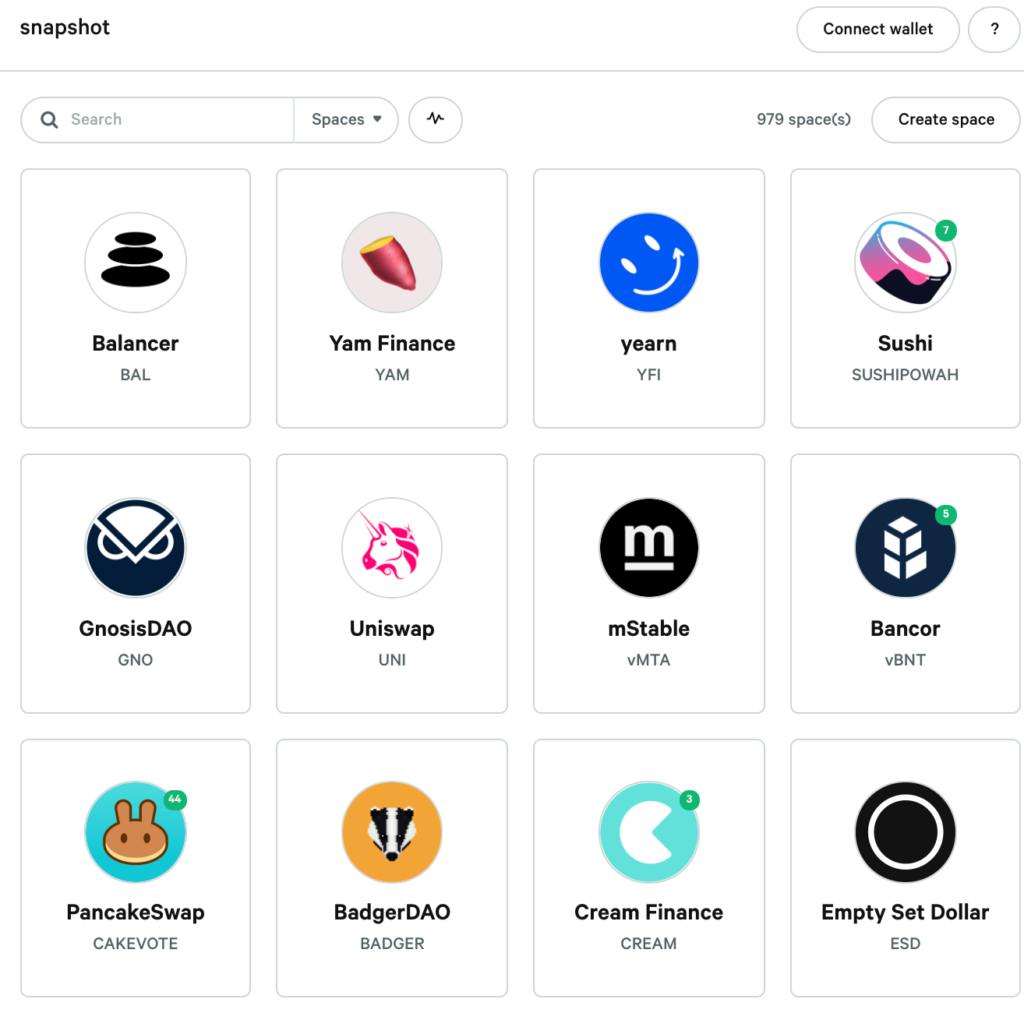 Examples of governance tokens. [Image source]
Examples of governance tokens. [Image source]
DAO governance can serve some or all of the following purposes:
Asset Management: DAOs often raise initial capital via token sales, with the remaining funds deposited in a treasury. However, as the DAO grows its user base and cash flow, it needs to manage the allocation of funds for projects.
HR Processes: Even a DAO needs a group of people to lead certain areas. However, the difference is token holders have full control of the election and ouster of officials. For example, the Ethereum Naming Service (ENS) DAO recently asked members to vote on a proposal for the removal of its director, Brantly Millegan.
Protocol Decisions: Governance tokens can be used to vote on proposals concerning the operation of a network. For example, members of the TerraDAO voted to burn an agreed number of Luna tokens and mint more TerraUSD stablecoins.
Governance is a critical part of DAO infrastructure. Even though these organizations have fluid structures, a decision-making framework is important. Otherwise, it may be impossible to reach a consensus on matters critical to the DAO's growth.
Challenges With Traditional DAO Voting Protocols
Most early DAOs adopted a token-based system of governance ("one token, one vote"). In this system, higher influence on DAO governance required a higher level of financial commitment. This arrangement ensured individuals with a proven commitment to the health of the DAO had greater input in running it.
Token-holder voting systems provide a simple, safe, and transparent way for DAOs to make decisions. Once a proposal is up for discussion, members can cast their "votes" on-chain and verify the results. There are no hidden election processes; everything is right there on the blockchain for everyone to see.
But, as innovative as they are, 1T1V systems may pose problems:
Centralization
In a hypothetical scenario, wealthy individuals can buy up governance tokens to accumulate undue influence within the DAO. If the said individual has less-than-benign intentions, the future of the DAO may be threatened.
This problem was on full display during the Steem-Tron saga of 2020. Decrypt has a much more detailed breakdown of the dispute, but here's a TL;DR version:
Justin Sun, the owner of Tron blockchain, bought social media blockchain Steem. However, community members were unaware of the deal, and understandably, rejected Tron’s takeover of Steem.
Now, Steem is a delegated proof-of-stake protocol where token holders can vote on the selection of "Witnesses". Witnesses are "supernodes" responsible for securing the blockchain and validating transactions on the Steem blockchain.
Witnesses have an outsized influence, such that anyone who controls the Witnesses controls the network.Thus, Witness selection became the new battleground for Justin Sun and community members opposing the takeover.
In a protracted battle worthy of the Netflix treatment, Sun and hostile Steem holders entered a slugfest to wrest control of the blockchain. Each camp accumulated eye-popping amounts of tokens to secure Witness positions for their preferred representatives. Benefiting from a large war chest, Sun (himself a billionaire) succeeded in electing his Witnesses, effectively taking control of Steem despite overwhelming opposition.
Similar problems have surfaced in EOS, another blockchain where 'Delegates' are elected to validate blocks. Certain individuals buy tokens, and even collude with exchanges to use tokens belonging to others, to vote for select representatives.
In these cases, token-based governance degenerates into a form of plutocracy where wealthy elites control power. Which goes against everything that on-chain governance and DAOs promise.
Rational Indifference
If tokens held = voting power, then it follows that DAO members with smaller token holdings may have lower incentives to participate in governance. An individual may see their influence on proposal outcomes as minimal and rationalize refusal to participate in voting.
"Rational indifference", as it's known, can discourage DAO members from active participation, leaving token whales at the helm of governance. This re-introduces the principal-agent problem and negates the essential value-proposition for DAOs: putting power in the hands of every stakeholder.
Rational indifference may also make collusion easier. With little incentive to vote on proposals, DAO members can sell their governance tokens to the highest bidder for voting purposes. Or, they can "lend" their tokens via flash loans and re-acquire them after the other entity might have used them to influence voting outcomes.
Incompetent Leadership
In a DAO, policymaking may be crowdsourced and open to anyone holding governance tokens. While this ensures every stakeholder has input in policies, it may give rise to a kakistocracy—leadership by the least competent—especially if the wrong individuals acquire the lion's share of tokens.
English author Douglas Adams once quipped: "It is a well-known fact that those people who most want to rule people are, ipso facto, those least suited to do it." With governance tokens circulating on the open market, entities can effectively buy their way into power.
Such individuals may not necessarily have the competence or expertise to justify their influence on decision-making. Worse, they may be aligned against the interests of the larger collective in the DAO.
For example, a shadowy investor hoping to profit from shorting a DAO's tokens may deliberately destabilize governance mechanisms. The threat of "dark DAOs", malicious groups coordinating to exhibit undue influence on DAOs through token accumulation, is extensively covered here.
This problem, known as the Tragedy of Commons, already exists in traditional economies. And it looks like DAOs may be the next victim of the selfish or unwise behavior of a small group.
Can DAO Governance Improve?
Finding a governance mechanism fit for purpose is a difficult task. The right DAO voting protocol must account for the problems discussed in the preceding section, a task easier said than done.
Nonetheless, there are various experiments in the ecosystem to improve the current governance process. This section will discuss some of these alternatives to traditional 1T1V systems and consider their utility:
1. Delegated Voting/Liquid Democracy
Sometimes, DAO members can be indifferent to proposals simply because they don't have the mental bandwidth to understand the issues at stake. Especially if the said individuals treat participation in a DAO as a part-time activity, they may be unwilling to commit the time necessary to decide on important matters.
To mitigate such problems, delegated voting aka "liquid democracy" is a possible solution. Delegated voting is just that—delegating an individual to vote on your behalf. In this case, the delegate is likely a reputable member of the DAO or an individual with proven expertise on the issues under consideration.

Aragon is among the high-profile DAOs to use delegated voting to solve governance-related problems. Liquid democracy encourages competent decision-making, since power is linked to their reputation or expertise, not token holdings. Plus, delegated voting may theoretically produce decisions that reflect the wishes of the community.
"But doesn't delegated voting introduce the same issues as coinholder voting?"
Delegated voting can indeed increase the possibility of collusion, bribery, and the infamous principal-agent problem. However, well-designed delegated voting systems can be an improvement on existing voting protocols.
For starters, DAO members can withdraw their delegated powers anytime they wish. This contrasts with corporate governance mechanisms where removing a rogue Board of Directors can prove difficult.
Thus, it becomes near-impossible to coerce individuals or suppress opinions since token holders can choose to exercise their rights. This also keeps delegates accountable to members of the DAO and mitigates the “principal-agent” problem common in traditional governance.
2. Holographic Consensus
Holographic consensus is a voting system developed by DAOstack to scale DAO governance. Right now, there are DAOs with thousands of members, and getting members to vote on every proposal can be difficult, if not outright impossible.
The thinking behind holographic consensus is that attention spans are limited, so only the most important proposals should come up for voting. Proposals deemed unnecessary can be screened out, ensuring that the attention of DAO members is harnessed properly.
Holographic consensus uses a cutting-edge process that combines elements of prediction markets with DAO governance. Here's how that works in practice:
Governance is facilitated through DAOstack's collective attention token, GEN. Token holders cannot vote on proposals, but they can 'bet' on which proposals are likely to succeed. If the proposal passes, holders get rewarded with more GEN tokens. But if the proposal falls through, their GEN holdings are slashed.
Any DAO member who meets the required specifications can initiate a proposal. Proposals that receive high GEN bets are 'boosted' and pass to the next round. At this stage, proposals with low GEN bets are screened out.
Proposals from Round 1 are voted on by members with voting rights. GEN holders can either make profits or losses on their bets depending on whether their choice proposal passes or not. Afterward, approved proposals are executed and implemented in the DAO.
Holographic consensus makes sense for several reasons. It reduces voter fatigue, which occurs when individuals are required to vote too many times. In HC-enabled governance, DAO members can concentrate on high-stake proposals and quickly decide on them.
Moreover, it prevents malicious individuals from attacking a DAO by initiating nefarious proposals. A would-be attacker needs to boost a proposal, which means spending their money to buy GEN tokens. That increases the cost of attack and may discourage governance attacks on DAOs.
However, there are questions over the perceived usefulness of holographic consensus. Holographic consensus introduces complexity into DAO governance, and members may find the learning curve too steep.
Besides, nothing rules out GEN holders from holding governance tokens. This leaves the door open for bettors to influence the results of the voting. After all, they have everything to lose if their boosted proposal fails to go through.
3. Weighted/Reputation-Based Voting
Earlier, we explored the problem of outsiders, such as crypto whales, buying governance tokens to exercise undue influence in a DAO. In this scenario, someone disinterested in the long-term survival of the collective can accrue enough power to destabilize it for selfish gain.
To prevent this problem, some DAOs are using weighted and/or reputation-based voting systems. These two concepts are somewhat similar, although differences remain.
In weighted voting schemes, the voting power of tokens depends on how long they've been held. Weighted voting schemes incentivize holders to lock up their tokens to improve the utility of their votes.
Weighted voting schemes make it harder to acquire voting power in a DAO. You can't just borrow governance tokens from the market and immediately use them to influence voting results. This won't rule out governance attacks entirely, but it significantly increases the cost of executing one.
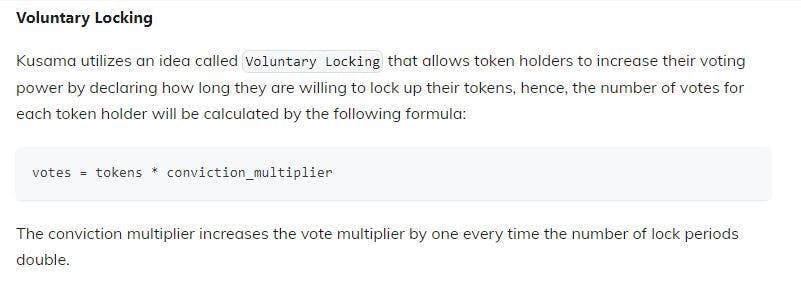
The reputation-based voting system follows a similar pattern. Here, DAO members get a single, non-transferable token specifically for voting on proposals. And the voting power attached to each token is linked to the reputation of its holder.
'Reputation points' can be earned in different ways. A DAO may reward individuals with reputation points according to their membership history. Or, members can earn more reputation points by contributing positively to the organization's growth (for example, by completing tasks).
Reputation voting can ensure individuals with a rich history of participation in the organization acquire great influence. This means an outsider will find it cumbersome to infiltrate the DAO through governance mechanisms.
However, reputation voting may be deemed unfair in certain instances. For example, what if a reputable member suddenly goes rogue and uses their influence in the organization for malicious purposes. Wouldn't reputation systems just re-introduce the Tragedy of Commons?
Because someone acquired reputation points during the early phase of a project doesn't mean they should hold leadership status forever. Especially if their contribution declines, it'd be unfair for genesis members to wield more power than new but active members.
There are two possible solutions here. First, DAOs can make reputation points revocable. If a member is guilty of misconduct, their reputation points should decline to reflect that.
Second, reputation points can be programmed to reduce over time, or even expire. This solves the problem of unfairness and keeps power in DAOs fluid.
Reputation systems have other flaws, though. Anyone can sell their private keys to transfer reputation (reputation points are linked to wallets). Still, it's difficult to form a thriving market around the sale of reputation points, so this is a viable mechanism for promoting effective DAO governance.
4. Quadratic Voting
Quadratic voting is a novel governance mechanism that’s gained support from the likes of Ethereum founder Vitalik Buterin. Quadratic voting is appealing because it offers an alternative to coinholder voting and reduces the influence of whales on voting outcomes.
In a quadratic voting scheme, everyone gets one vote once on a proposal. However, they can purchase more “credits” to cast more votes for their preferred option.
"Wait, isn't that essentially what 1T1V systems do?"
Well, not exactly. In a 1T1V system, the cost of additional votes is linear. If you need five extra votes, you just need five more tokens. In a quadratic voting system, the cost of additional voting is quadratic; one vote costs one token, two votes cost four tokens, three votes cost three tokens, and so on.
Quadratic voting allows individuals to express the extent of their support for a proposal by purchasing vote credits. This makes quadratic voting the DAO version of "putting your money where your mouth is."
At the same time, it reduces the influence of crypto whales in decision-making. From our earlier example, it's obvious that the utility of additional voting decreases, while costs increase. It'd take a lot of money for a dark DAO to acquire enough tokens to distort outcomes.
Of course, that doesn't rule out vote-buying. Quadratic voting even makes token-buying more lucrative since first votes count for a lot.
Projects like Gitcoin DAO alleviate this problem by using stringent identification systems that make it difficult to transfer voting rights. For instance, users have to register a profile with decentralized identity services like Proof of Humanity, BrightID, Ethereum Naming Service (ENS), and Idena.
Final Thoughts
In its current form, DAO governance is far from perfect. But the sector is investing in novel governance mechanisms to achieve higher member participation, equitable distribution of power, and efficient decision-making.
Whether experiments like quadratic voting and holographic consensus will replace traditional coinholder voting is up for debate. Nonetheless, we can expect DAOs to keep reiterating until they find the ideal governance system that promises the most benefits to members and the larger ecosystem.

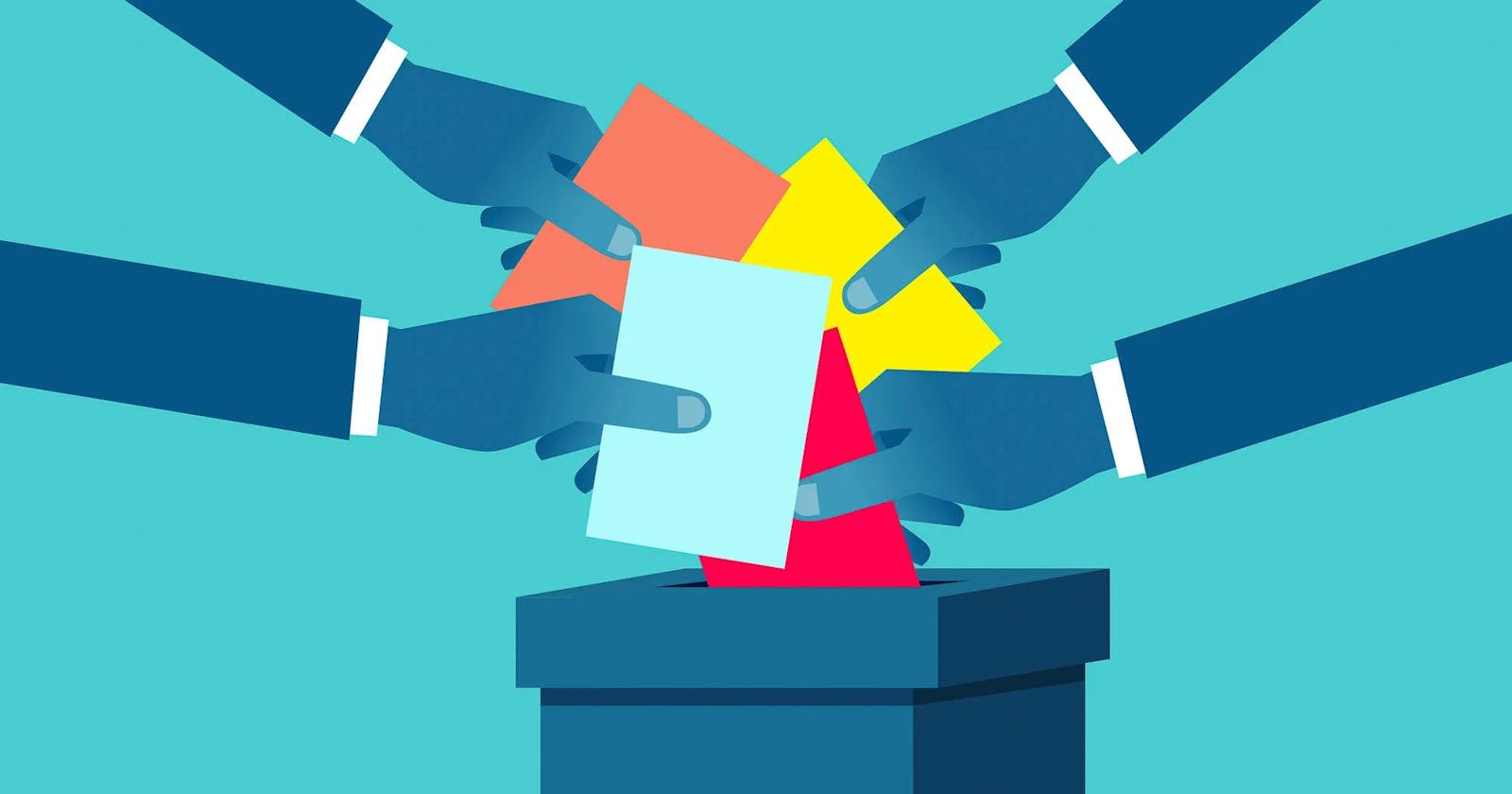
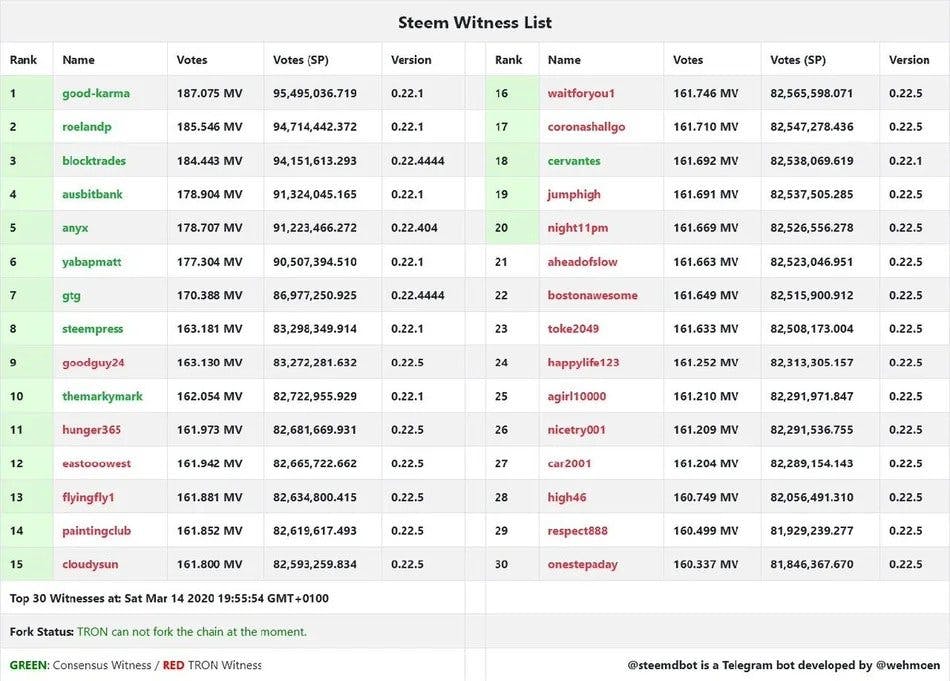 [
[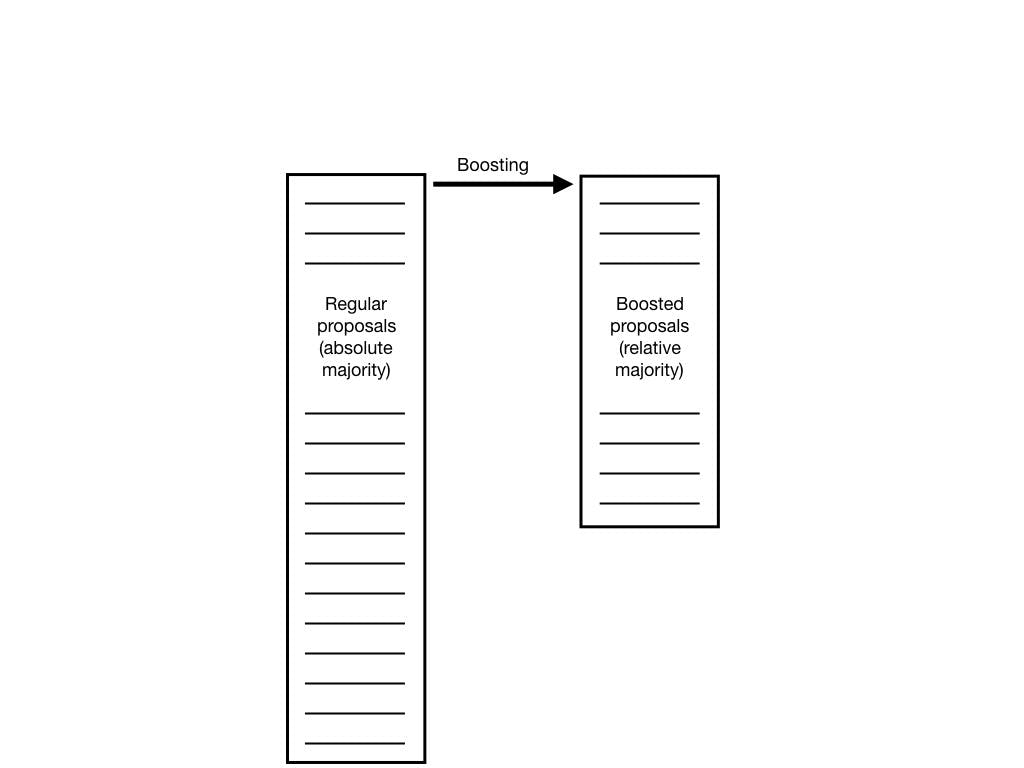 [
[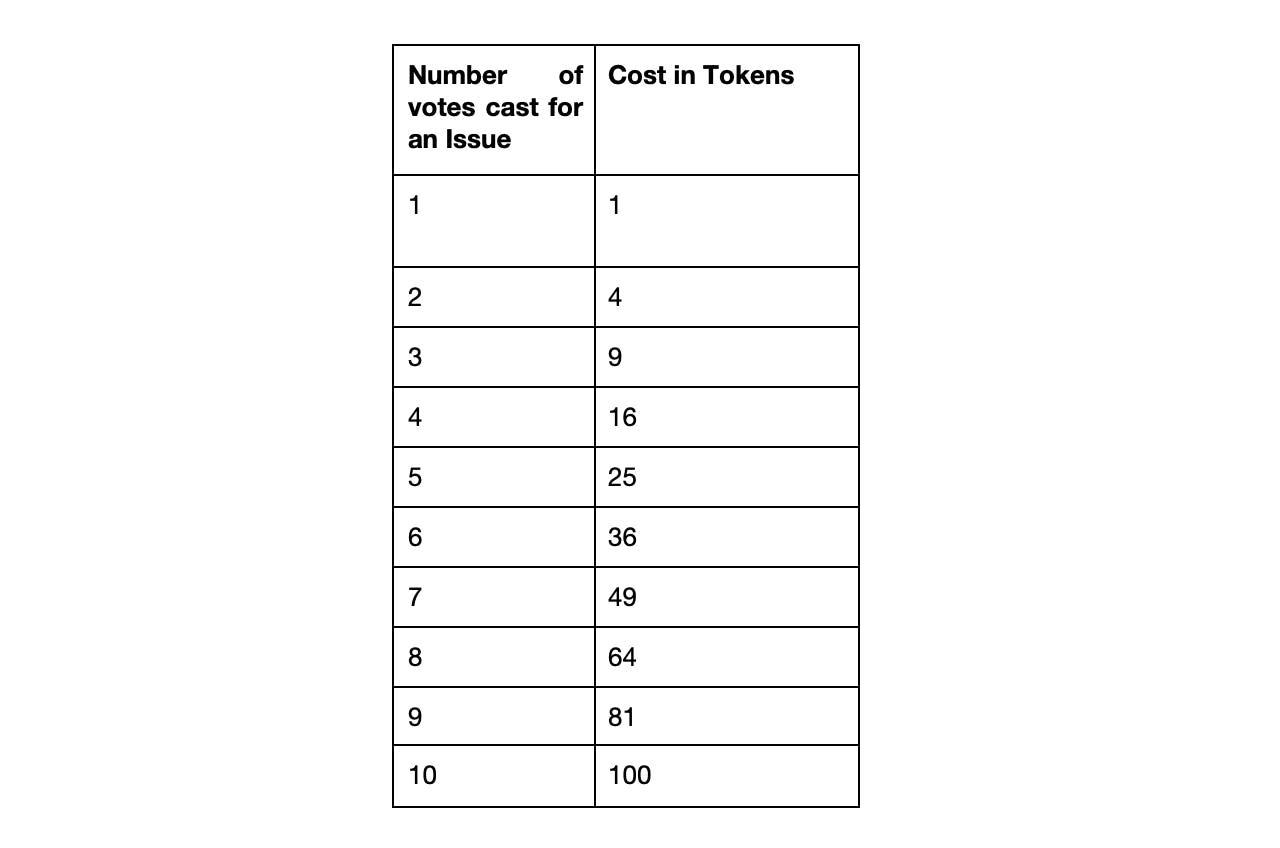 [
[